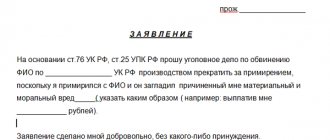Acknowledgment of the claim
The defendant's acceptance of the claim may also be the result of a conciliation process. The procedure for the defendant’s recognition of claims is regulated by Art. 157 CAS RF.
Recognition of the claim by the defendant and its approval by the court leads to a decision to satisfy the claims made by the administrative plaintiff.
Admission of a claim must be distinguished from admission of facts. In this case, the defendant admits only certain factual circumstances, but not the stated claim. The legal consequences of these procedural actions are different. Recognition of a fact (circumstance) by one of the parties frees the other party from the need to prove this fact (circumstance) in further proceedings (clause 4 of article 65 of the CAS RF).
Negotiation
Negotiations are a conciliatory procedure through which the parties can resolve their differences independently. The main difference between negotiations and other methods of reconciliation is the absence of a mediator specifically specified in the law.
Negotiations are among the most common, simple and accessible means of conflict resolution. As a rule, they do not require additional costs, do not pose a risk to the parties and are aimed at constructive discussion of problems.
Negotiations can take place both before and after the initiation of a case in court. To use the procedure in a trial, it is necessary to apply to the judge with a petition in the prescribed form to appoint a PP and suspend the trial for its conduct.
The procedure for conducting negotiations is not defined in the CAS of the Russian Federation or other regulations. The legislator especially emphasizes the dispositive nature of negotiations, indicating that they are carried out on conditions determined by the parties. The conditions in this case also mean the rules for conducting the PP, agreed upon by the parties.
It seems that when conducting negotiations, the parties must also take into account the provisions of Art. 434.1 of the Civil Code of the Russian Federation, correlating them with the features of the administrative process.
Mediation (mediation)
Mediation is a method of resolving a conflict with the assistance of a mediator in order for the parties to reach a mutually acceptable solution (Article 2 of the Law on Mediation).
The mediation procedure can be applied both before the applicant goes to court and after the start of the trial, including at the suggestion of the judge. Moreover, the presence of an agreement between the parties on the use of mediation, as well as the out-of-court conduct of this procedure, is not an obstacle to a party seeking judicial protection (Clause 3 of Article 7 of the Law on Mediation).
Note! The CAS of the Russian Federation (Article 137.5) contains a list of categories of cases in which the use of the mediation procedure is not allowed. In particular, these are the cases:
The use of the mediation procedure is possible only on the basis of mutual agreement. No one can be forced to participate in this procedure. Voluntary participation also means the possibility of withdrawing from the procedure at any stage (clause 4 of article 14 of the law on mediation).
Note! According to Art. 10 of the Law on Mediation, the activities of mediators can be either paid or free. But the activities of organizations providing mediation procedures are always paid.
You can learn about how the procedure goes and its stages from the article “Procedure and features of the mediation procedure.”
If the mediation was successful and the parties managed to agree on a settlement of the dispute and enter into a mediation agreement, then the court should be notified about this. The agreement reached is subject to approval by the court in accordance with Art. 137.1 CAS RF.
Article 137 CAS RF. Reconciliation of the parties. Agreement on reconciliation of the parties (current version)
Part 3 Art. 137 CAS RF also establishes requirements for the form and content of the agreement on reconciliation of the parties. These provisions are enshrined by analogy with the provisions of Parts 1 and 2 of Art. 140 of the Arbitration Procedure Code of the Russian Federation, which provides for the following: a settlement agreement is concluded in writing and signed by the parties or their representatives if they have the authority to conclude a settlement agreement, specifically provided for in a power of attorney or other document confirming the authority of the representative (Part 1); the settlement agreement must contain information agreed upon by the parties on the conditions, amount and timing of fulfillment of obligations to each other or one party to the other; the settlement agreement may contain conditions on deferment or installment plan for the fulfillment of obligations by the defendant, on the assignment of rights of claim, on full or partial forgiveness or recognition of debt, on the distribution of legal costs and other conditions that do not contradict federal law (Part 2). This article also contains parts 3 and 4, according to which: if the settlement agreement does not contain a provision on the distribution of legal costs, the arbitration court resolves this issue when approving the settlement agreement in the general manner established by this Code (part 3); the settlement agreement is drawn up and signed in a number of copies exceeding by one copy the number of persons who entered into the settlement agreement; one of these copies is attached to the case materials by the arbitration court that approved the settlement agreement (Part 4). Similar provisions in Art. 137 CAS RF was not included, but, apparently, the corresponding rules are implied.
In Part 4 of Art. 137 of the CAS of the Russian Federation, which regulates the court’s consideration of the issue of approving an agreement on reconciliation of the parties, includes provisions similar to the following enshrined in Parts 2 and 3 of Art. 141 of the Arbitration Procedure Code of the Russian Federation: the issue of approving a settlement agreement is considered by the arbitration court at a court hearing; persons participating in the case are notified of the time and place of the court hearing (Part 2); If the persons who entered into a settlement agreement and were duly notified of the time and place of the court hearing fail to appear at the court hearing, the issue of approving the settlement agreement is not considered by the arbitration court, unless an application has been received from these persons to consider this issue in their absence (Part 3 ). At the same time, in contrast to these provisions in Part 4 of Art. 137 of the Code of Arbitration Code of the Russian Federation does not indicate the possibility of approving an agreement on reconciliation of the parties if the persons who entered into such an agreement submit an application to consider the issue of approving such an agreement in their absence.
As explained in paragraph 17 of the Resolution of the Plenum of the Supreme Arbitration Court of Russia 2014 N 50, according to Part 2 of Art. 141 of the Arbitration Procedure Code of the Russian Federation, the issue of approving a settlement agreement is considered in a court hearing; if the parties agreed to conclude a settlement agreement during the preparation of the case for trial, which the arbitration court became aware of at the preliminary court hearing, and they are present at this court hearing or sent an application to consider this issue in their absence (Part 3 of Article 141 Arbitration Procedure Code of the Russian Federation), the court may, in relation to Part 4 of Art. 137 of this Code, complete the preliminary court hearing, open a court hearing in the first instance and consider the possibility of approving a settlement agreement (except for the case where a collegial hearing of the case is required).
Provisions of Part 5 of Art. 137 CAS RF, indicating cases in which the court does not approve an agreement on reconciliation of the parties, are enshrined by analogy with the provisions of Part 6 of Art. 141 of the Arbitration Procedure Code of the Russian Federation, according to which the arbitration court does not approve a settlement agreement if it contradicts the law or violates the rights and legitimate interests of other persons. Accordingly, it is necessary to keep in mind the following clarifications given in paragraphs 13 and 14 of the Resolution of the Plenum of the Supreme Arbitration Court of Russia 2014 N 50:
— due to the principle of freedom of contract (Article 421, Part 1 of the Civil Code of the Russian Federation), a settlement agreement may contain any conditions that do not contradict the law or other legal acts. At the same time, the Arbitration Procedure Code of the Russian Federation establishes an exhaustive list of grounds, in the presence of which the arbitration court refuses to approve a settlement agreement, namely: its contradiction to the law and violation by this agreement of the rights and legitimate interests of other persons (Part 6 of Article 141). Thus, when concluding a settlement agreement, the parties can independently dispose of the material rights belonging to them; they are free to agree on any terms of the settlement agreement that do not contradict federal law and do not violate the rights and legitimate interests of other persons, including when including provisions in the settlement agreement that are related to the stated requirements, but were not the subject of legal proceedings (clause 13);
- the arbitration court, when considering the issue of approving a settlement agreement, examines the factual circumstances of the dispute and the arguments and evidence presented by the persons participating in the case, evaluates them only to the extent and insofar as this is necessary to establish compliance of the settlement agreement with the requirements of the law and the absence of violations of rights and legal interests of other persons (Part 6 of Article 141 of the Arbitration Procedure Code of the Russian Federation), in particular, checks the powers of the persons who signed the draft settlement agreement, the presence of the will of a legal entity to conclude a settlement agreement, whether it is possible to dispose of the property that is the subject of the settlement agreement, whether such property has encumbrances, whether the draft settlement agreement complies with the mandatory norms of the current legislation, incl. on transactions (except for cases where such verification is carried out by the court only at the request of the relevant person), and also studies the draft settlement agreement for the purpose of identifying conditions affecting the rights and legitimate interests of persons not participating in the case (taking into account the provisions of paragraph 3 of Art. 308 of Part 1 of the Civil Code of the Russian Federation) (clause 14).
Cases when the court does not approve the agreement of the parties on reconciliation are also mentioned in the norm of Part 6 of Art. 46 CAS RF, but there is no need to talk about duplication of norms. Thus, according to this norm, the court does not approve the agreement of the parties on reconciliation if the conclusion of the agreement is directly prohibited by law, contradicts the essence of the administrative case under consideration or violates the rights of other persons. Accordingly, for a not entirely clear reason, the provisions of Part 5 of Art. 137 CAS RF are somewhat different from the provisions of Part 6 of Art. 46 of this Code.
Part 6 art. 137 of the CAS of the Russian Federation provides for the types of rulings made based on the results of consideration of the issue of approving an agreement on reconciliation of the parties. Similar provisions are formulated in Parts 5 and 7 of Art. 141 of the Arbitration Procedure Code of the Russian Federation in more detail. Thus, according to Part 5 of this article, based on the results of considering the issue of approving a settlement agreement, the arbitration court issues a ruling. Part 7 of this article provides that the ruling of the arbitration court indicates: 1) approval of a settlement agreement or refusal to approve a settlement agreement; 2) terms of the settlement agreement; 3) return to the plaintiff from the federal budget half of the state duty he paid, except for cases where the settlement agreement was concluded in the process of executing a judicial act of the arbitration court; 4) distribution of legal costs. It also established that the ruling on approval of a settlement agreement concluded in the process of executing a judicial act of an arbitration court must also indicate that this judicial act is not subject to execution.
In Part 7 of Art. 137 of the Code of Arbitration Code of the Russian Federation indicates the possibility of filing a private complaint against a court ruling to approve an agreement on reconciliation of the parties or to refuse to approve the said agreement. This rule is somewhat different from those that follow from the provisions of Parts 8 and 9 of Art. 141 of the Arbitration Procedure Code of the Russian Federation and according to which: the ruling on approval of the settlement agreement can be appealed to the arbitration court of the cassation instance within a month from the date of the ruling (Part 8); The ruling refusing to approve the settlement agreement can be appealed (Part 9).
Part 8 art. 137 of the CAS RF provides that when the court approves an agreement on the reconciliation of the parties, the administrative proceedings are terminated completely or in the relevant part. Ch. 15 of the Arbitration Procedure Code of the Russian Federation does not contain such a provision; the corresponding rule follows from the norm of Part 2 of Art. 150 “Grounds for terminating proceedings in a case” of this Code, which establishes (as amended by Federal Law No. 205-FZ of July 19, 2009) that the arbitration court also terminates proceedings in a case if a settlement agreement is approved and in other cases provided for by this Code cases.
Provisions of Part 9 of Art. 137 CAS RF, regulating the execution of the agreement on reconciliation of the parties, are enshrined by analogy with the provisions of Art. 142 “Execution of a settlement agreement” of the Arbitration Procedure Code of the Russian Federation, which establishes the following: a settlement agreement is executed by the persons who entered into it voluntarily in the manner and within the time limits provided for by this agreement (Part 1); a settlement agreement not executed voluntarily is subject to enforcement according to the rules of Section. VII “Proceedings in cases related to the execution of judicial acts of arbitration courts” of this Code on the basis of a writ of execution issued by the arbitration court at the request of the person who entered into a settlement agreement (Part 2).
As explained in paragraph 19 of the Resolution of the Plenum of the Armed Forces of Russia of 2015 N 50, a settlement agreement, a reconciliation agreement, not executed voluntarily, are subject to forced execution on the basis of a writ of execution issued by the court at the request of a party to this agreement (Part 2 of Article 142 of the APC RF, by analogy with the law by courts of general jurisdiction in civil proceedings on the basis of Part 4 of Article 1 of the Code of Civil Procedure of the Russian Federation, Part 9 of Article 137 of the CAS RF); the absence of information about non-fulfillment of the terms of a settlement agreement, a reconciliation agreement containing obligations of one or both parties to transfer property or to perform (failure to perform) certain actions is not a basis for the court’s refusal to issue a writ of execution and for the bailiff’s refusal to initiate an execution proceedings on the basis of a writ of execution issued by the court for the forced execution of a settlement agreement, a reconciliation agreement, since the circumstances related to the execution are subject to clarification during the enforcement proceedings.
Reconciliation of parties to a criminal case in practice
Unfortunately, in practice, a seemingly simple procedure for terminating a case through reconciliation of the parties raises many questions and difficulties. According to statistics, reconciliation of the parties at the pre-trial stage is much less common than in court, which is due to the reluctance of law enforcement agencies to carry out this procedure due to the perception of it as pressure on the victim or reluctance to close cases at the stage of completion and transfer it to court. However, you should not worry if the preliminary investigation refused to dismiss the case; in court, this can all be resolved much easier and faster. It is very important to ensure that the victim’s statement of consent to reconciliation of the parties is attached to the criminal case, then to provide for the mandatory appearance of the victim, to create for this all the conditions where he must re-attach the request for reconciliation to the case and support his position in the court hearing. If everything is done correctly, in 99% of 100% the court will decide to terminate the criminal case through reconciliation of the parties, and the accused will be released from criminal liability.
Reconciliation with the victim: how to reach a compromise
Reconciliation with the victim and making amends for the harm caused to him as a result of committing a crime for the suspect/accused means admission of guilt, complete repentance, an official apology, as well as monetary compensation for the material and moral damage caused. The main problem, as a rule, arises in the issue of establishing monetary compensation, the amount of which is established by agreement of the parties and must be extremely reasonable, justified and truly correspond to the amount of damage caused. In practice, the issue of making amends is especially acute in terms of the psychological difficulty of reaching an agreement. The victim, finding himself in a stressful situation as a result of a crime and having received serious psychological trauma, is not always ready to forgive his opponent and reach a settlement agreement. Negotiations reach a dead end due to a discrepancy between the wishes of each party regarding the amount of compensation; very often the victim demands an unreasonably inflated amount, which the suspect is simply unable to pay. To avoid such disputes, each party must provide compelling reasons for its position, and more often than not, involving a qualified mediator in the problem allows the issue to be resolved in a matter of hours.
Important! The victim’s application to terminate the criminal case in connection with the reconciliation of the parties must indicate exactly what actions aimed at reconciliation were performed by the suspect/accused.
The procedure for reconciliation of parties under the law
Reconciliation of the parties is carried out in strict sequence:
- the parties enter into a reconciliation agreement;
- the victim submits an application to the investigative authorities or the court about his consent to reconcile with the suspect/accused;
- authorities decide on the possibility of reconciliation of the parties and termination of the criminal case.
Just as in the case of reaching a compromise on issues of the amount of compensation for damage, there are enough difficulties in the issue of making a decision on reconciliation by executive authorities. The whole point is that termination of a criminal case after reconciliation of the parties, even if all the necessary conditions are present, is only a right, and not an obligation for law enforcement and judicial authorities. Thus, the inquiry officer, investigator or judge may refuse to satisfy the victim’s application if they come to the conclusion that for some objective reasons, the suspect/accused cannot be released from punishment provided for by criminal law. Also, it is worth noting that although the legislation does not directly establish a condition for the reconciliation of the parties on the full admission of guilt by the suspect/accused of committing crimes, this requirement follows automatically from the meaning of other conditions, that is, a person who has committed a crime can reconcile with the victim only upon recognition guilt and remorse for what he did.







